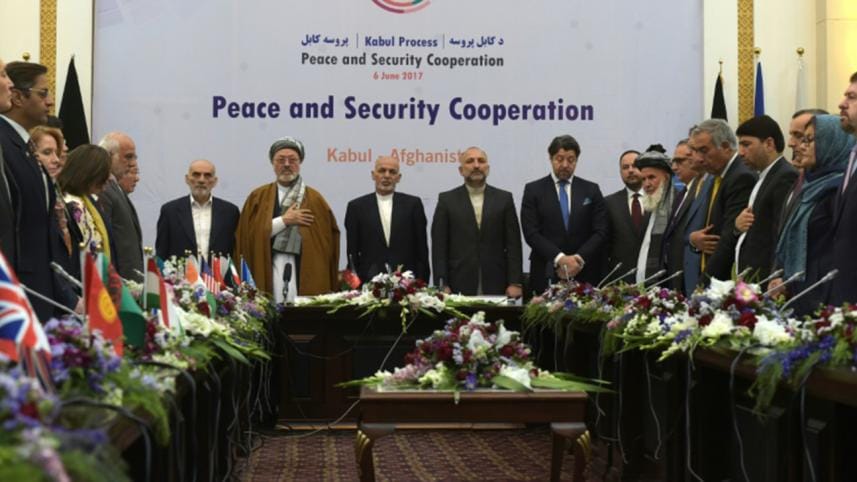Afghan leader issues ultimatum to Taliban

Afghan President Ashraf Ghani issued an ultimatum to the Taliban Tuesday, warning them to embrace peace or "face consequences" after announcing that the death toll from last week's devastating truck bombing had passed 150.
Ghani has come under mounting criticism over the bombing, the deadliest in Kabul since 2001, with protests and deadly street clashes roiling the Afghan capital as people incensed by spiralling insecurity call for his government's resignation.
The president made a strong plea for peace at an international conference on Afghanistan attended by around two dozen countries, which was held under tight security as armoured vehicles patrolled the streets and fighter jets roared over the capital.
"We are offering a chance for peace but this is not an open-ended offer," Ghani said.
"Time is running out... this is the last chance: take it or face consequences."
The conference, labelled the "Kabul Process", aims to build international support for ways to restore security in Afghanistan.
Kabul has been on edge since the massive truck bomb last Wednesday ripped through the city's highly fortified diplomatic quarter, home to the presidential palace and a host of foreign embassies.
The death toll has jumped to more than 150 people, while over 300 wounded were brought to hospitals, many with burns and amputations, Ghani told the conference.
"We are a nation of survivors. Terrorists can shed our blood but they cannot break our will," he said.
Officials had previously placed the death toll the attack at 90. Ghani did not explain the dramatic jump but Afghan authorities have played down casualty figures in the past.
Ghani offered the Taliban the opportunity to open a representative office, adding that he was flexible about the location of future talks.
The insurgents responded to the conference by firing a rocket at what they claimed was NATO's headquarters. It landed inside the Indian ambassador's residence and no one was hurt.
Underscoring the growing insecurity, a motorcycle bomb exploded near the Grand Mosque in the western city of Herat, killing seven people and wounding 16 according to the interior ministry.
Rising tensions
Ghani has faced growing calls to step down since four people were killed Friday when hundreds of protesters incensed by the truck bombing in Kabul clashed with police, prompting officials to respond with live rounds fired in the air.
The protesters, holding a sit-in for a fifth day Tuesday near the bombing site, have also demanded the resignation of security chiefs including national security adviser Hanif Atmar.
The attacks have worsened tensions between rival ethnic groups and raised the prospect of a political crisis.
Foreign Minister Salahuddin Rabbani, who heads the mainly ethnic Tajik Jamiat political group, also called for Atmar's dismissal on Monday. But Ghani, who like Atmar is from the majority Pashtun ethnic group, firmly rejected the demand.
Rabbani survived an attack at the funeral of one of the protesters on Saturday, when a suicide bomb tore through a row of mourners and killed seven more people.
He blamed "terrorists within the system" for the funeral blasts, suggesting they were an inside job.
The government has accused the Taliban-allied Haqqani Network of carrying out Wednesday's attack, and said the funeral was targeted by bombers trained at a religious seminary in Pakistan.
Previous international efforts to bring the Taliban to the negotiating table have failed, but diplomats in Kabul hailed Tuesday's conference as a stepping stone to peace.
"The launch of the Kabul Process tomorrow is an important marker for each and every country in the region to show its true support for Afghanistan's aspirations for peace," said British ambassador Dominic Jermey on Monday.



 For all latest news, follow The Daily Star's Google News channel.
For all latest news, follow The Daily Star's Google News channel.
Comments